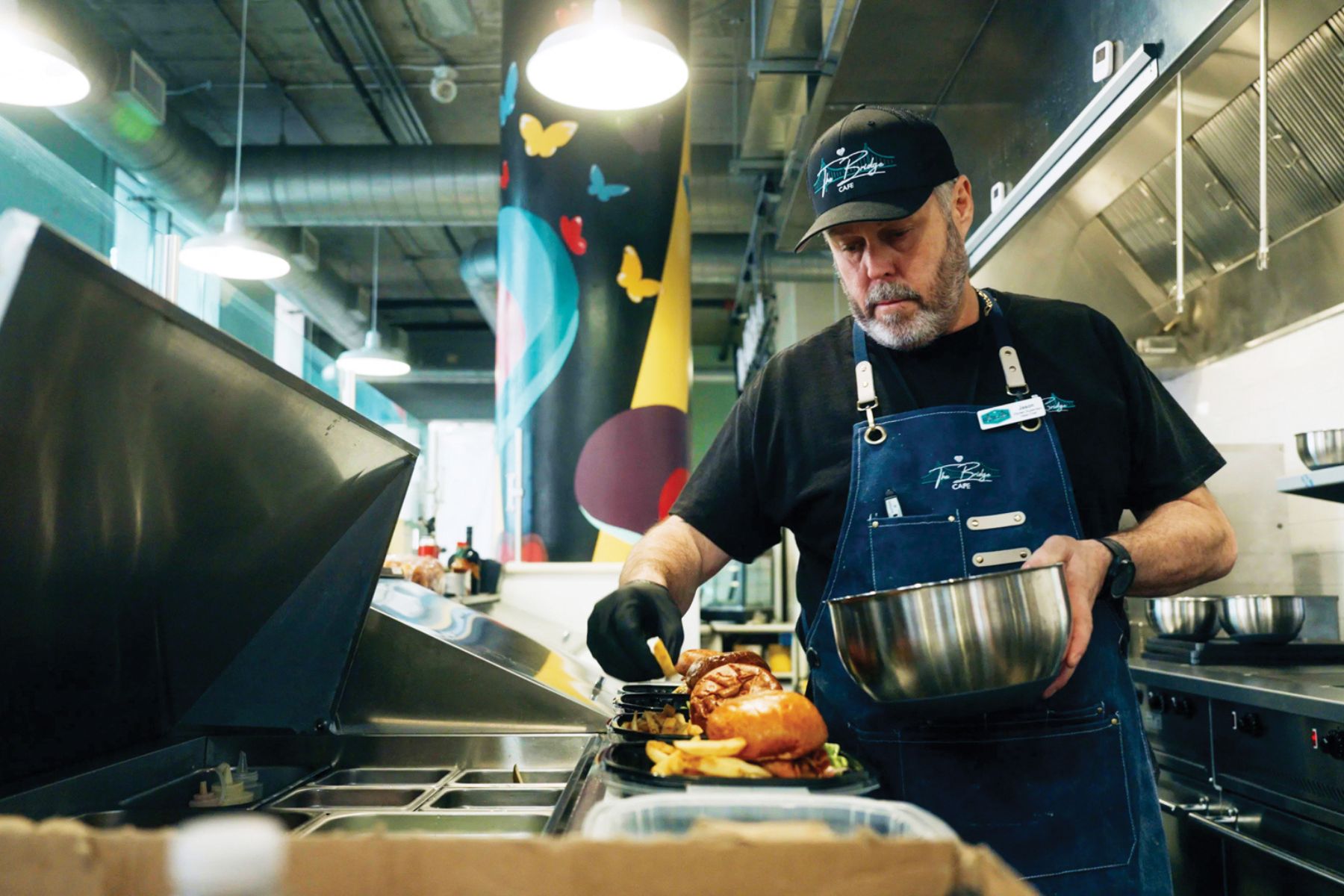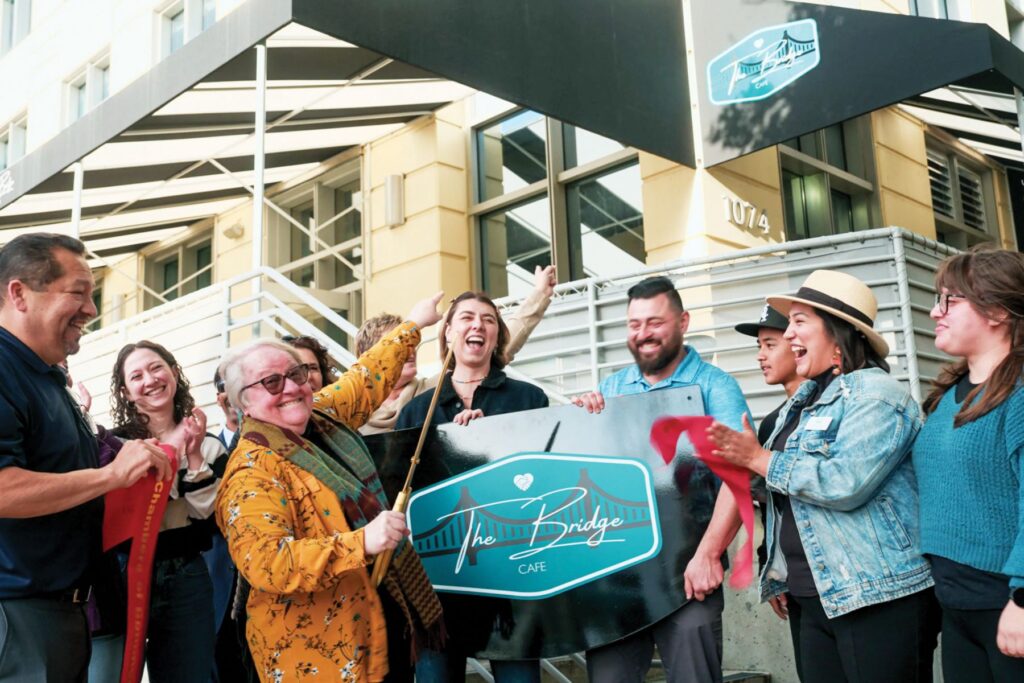
Formerly incarcerated staff at this San Luis Obispo café imagine a world beyond bars
For people with a criminal record, finding meaningful work can be difficult. But as this Edible story explains, The Bridge Café in San Luis Obispo offers opportunity and hope to the formerly incarcerated.
Story by Annie Secrest
Photography by Stephan Heraldo
Standing behind the grill of The Bridge Café in San Luis Obispo, Head Chef and General Manager Jason Hunter prepares farm-to-table style meals for hungry patrons. It’s a job that he believes may have saved his life.
Following in the footsteps of generations before him, Jason enrolled in the military when he was in his 20s. He served multiple tours that took him to Somalia and Iraq. His enlistment was rewarding, but during his last tour in Iraq, he was attacked and severely injured by a young child. The encounter left Jason with physical and mental scars that haunted him for at least the next decade.
After leaving the Armed Forces, he was in desperate need of mental health services but failed to find help. To cope with the turmoil brewing inside him, he turned to drugs and alcohol. Within a year of returning to civilian life, he found himself entangled in the prison system, in which he spent the next 10 years.
His first offense landed him a one-year sentence, but within six months of his release, he was arrested again and given another three years. The cycle continued when he was soon rearrested after his second release. “I was a bad drug dealer,” he lightheartedly jokes. His third sentence was for nearly a dozen felonies. That time, though, something within him fundamentally changed. “I was tired of being put in a box,” he explains. “I had never in my life been in trouble, and now I was 30 years old, getting in trouble for the first time. You get tired of being locked in a cage. It’s a long time to think about things.”

During a prison church service, Jason met Sister Theresa Harpin, Founder of Restorative Partners. The local organization is the only nonprofit in the county that provides full wraparound services for those returning to the community from incarceration. One of those services is The Bridge Café, an employment program that includes training. Jason credits Theresa with helping him get on the right path to obtain a job and even attend culinary school in San Diego, where he specialized in pastry. “Restorative Partners saved my life, and Sister Theresa is my angel,” Jason says.
For those with a criminal record, getting employed is a real challenge and contributes to our country’s high recidivism rate. Though discrimination based solely on criminal history is illegal, employers can and often find other reasons to disqualify a candidate who served time. “On job applications, they ask if you’re a felon. If you select yes, they pass you up,” Jason explains of his experience. “If you have a felony on your record, you can’t get a good job anywhere.” He says The Bridge Café is the exception, offering opportunity and hope.
That was the case for Jaycee Holland, too, a barista who works the cash register at the café. As a child, Jaycee used food as an artistic expression and an outlet to escape the toxic addiction and alcoholism that pervaded her family. But eventually, she found herself in the same trappings. While she never went to jail, Jaycee found herself with a baby and suffering from addiction. Her spirit is strong and sanguine today, but sorrow cloaks her voice as she recounts this dark period in her life. “I got to a point where I was either going to die, or I was going to heal and fix myself,” she shares. “One morning, I was so down, and I was at a crossroads. I had decided I would give [life] one last shot and reach out to a friend in recovery, and asked if she could help me.” Within a week of the friend agreeing to assist, Jaycee was enrolled in rehab. Ultimately she wound up at Bryan’s House, a drug addiction recovery program for women with children.
With her troubled past in the rearview mirror, Jaycee is enjoying her work as a barista and her recent promotion to assistant manager. She finds crafting coffee, what she calls “making little potions,” a creative outlet in a place that feels safe. “Being here allows me to be myself, and be respected,” she says. “I have a tattoo on my face, so people already see me a certain way before getting to know who I am, but here that is never the case. We are a family.”
Jason’s been out of the prison system for seven years without so much as a speeding ticket. He is now going through the lengthy process of getting his record expunged. Though recently promoted to general manager at the café, Jason still wears his head chef hat in that he continues to create unique pastries and foods. Now, the man previously described by his sentencing judge as a “menace to society” is referred to by café staff as “family.”
The café’s partnership with Cuesta College’s Culinary Arts Foundation Certificate of Specialization program allows people once involved in crime to pursue a culinary arts certificate. Jason’s typically stoic face brightens when he describes how he gives back to the community by training students in the program, who learn during an in-house internship at The Bridge Café.
This special eatery is more than a social enterprise; it’s a bridge that helps people leave behind the stigma of their past for a better future, a second chance.

